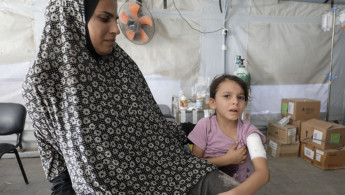'Preference protocol': Doctors' desperate attempt to preserve Palestinian genealogy
A doctor on call at Al-Awda Hospital's reception department within Nuseirat camp in central Gaza issues direct instructions to the medical staff: "Treat women and children first, and leave injured men aside."
This instruction surprises one of the nurses, who asks anxiously, "But some of the injured men are in critical condition!"
The doctor responds, "Follow the orders."
This occurred amid the chaos of dealing with a mass casualty event, in which more than 100 wounded people arrived to Al-Awda Hospital after an Israeli airstrike on the "Mufti" school, which houses thousands of displaced people in the Nuseirat camp on 13 October.
After intensive efforts by the medical staff, 22 people died from injures sustained from that Israeli airstrike, including 15 children.
The on-call doctor, Mohammed Abu Jamea, explained in an interview with The New Arab that the hospital is working under extreme conditions that far exceed its capabilities, with the number of patients exceeding available beds by five times, as well as severe shortage of medical capabilities, medicines and supplies.
He pointed out that this situation forced doctors to follow the "preference protocol", which stipulates classifying the wounded according to gender, and giving priority to children and women, in an attempt to preserve the Palestinian genealogy in light of Israel's genocide.
"For example, if we have an injured man and an injured child but only one intensive care unit, we would allocate it to the child," Abu Jamea added.
'Policy of extermination'
Ministry of Health's assistant undersecretary, Dr Abdel-Latif Al-Hajj, stated to TNA that Gaza's health institutions have adopted the "preference protocol" when dealing with the wounded, where priority is given to children and women.
He explained that this decision came as a result of the severe lack of medicines and medical supplies, pointing out that 77 percent of life-saving medicines are unavailable, 86 percent of medical supplies are missing, and drug stocks have decreased by 60 percent.
He stressed that Gaza's health system is operating below capacity as the Israeli army implements a systematic policy to destroy the health infrastructure, which has led to the loss of 70 percent of hospital beds due to Israeli attacks.
Al-Hajj indicated that most hospitals in the Gaza Strip are out of service, due to Israel's bombing or the depletion of fuel and electricity.
"There are 10 hospitals out of 36 hospitals in Gaza that are currently operating, and only partially," he said.
He added that hospitals that are still operating are experiencing severe shortages in vital medical equipment, as there are no X-ray or MRI machines, in addition to a shortage of medical laboratories, CT scans and generators.
Regarding the medical staff, Al-Hajj stressed that the health system has a shortage of human resources, after Israel killed 880 medical personnel, in addition to the dozens of doctors fled the horror of the war from the besieged coastal through the Rafah crossing before its closure in May 2024.
The Ministry of Health in Gaza announced in a statement on 11 October that the death toll from Israeli massacres in Gaza during the year is at least 42,126 killed and 98,117 wounded, and are mainly women and children.
Al-Hajj further noted that women and children amount to 60 percent of the dead and 70 percent of the wounded.
"It is clear that Israel is adopting a policy of exterminating generations of Palestinians by targeting women and children," Ismail Al-Thawabtah, Director General of the Government Media Office in Gaza, told TNA.
"This war can be classified as a war directed primarily against women and children, in addition to targeting the health system to prevent the wounded from receiving treatment and survive," Al-Thawabtah pointed out.
"Israel possesses highly advanced weapons that enable it to hit its targets accurately, but it is carrying out genocide with the aim of eliminating the Palestinian [genealogy]," he added.
Al-Thawabtah elaborated further that if the women killed by Israel had remained alive, they could have given birth to about 42,000 children in the span of a year. He argues that this points to Israel's insistence on restricting Palestinian population growth by targeting women and children.
He stressed that women, who constitute 49 percent of Palestinian society, represent the main pillar of any society and the vital for its continuity.
"Hence, the importance of implementing the preference protocol and classifying the wounded according to gender and giving priority to saving the lives of children and women," he grimly concluded.




 Follow the Middle East's top stories in English at The New Arab on Google News
Follow the Middle East's top stories in English at The New Arab on Google News


![A group of Palestinians, foreign and Israeli activists gather to participated in an olive picking event on the land in the town of Battir, which is under threat of confiscation by Israel in Bethlehem, occupied West Bank on 8 November 2024. [Getty]](/sites/default/files/styles/image_330x185/public/2182930803.jpeg?h=199d8c1f&itok=__0LgGsa)